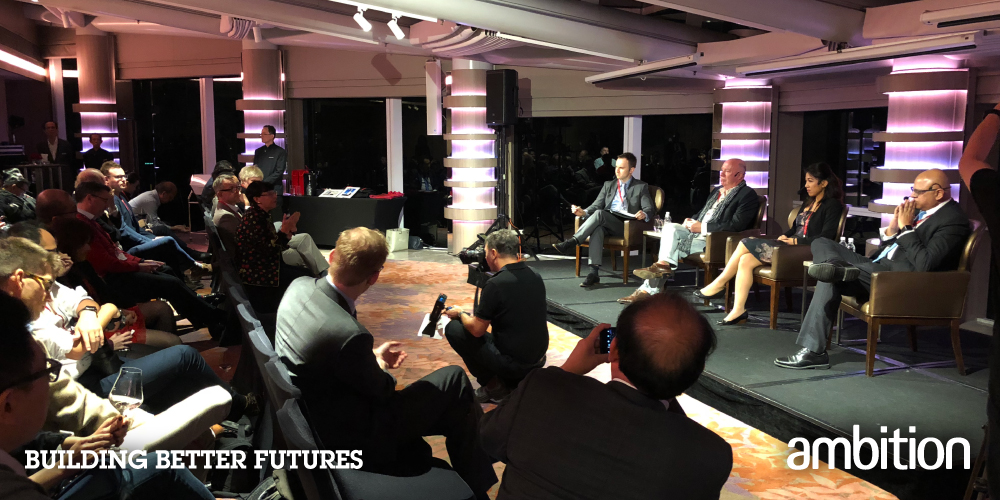Please beware of recruitment scams that are currently targeting jobseekers. Click here for further advice.

What will we face in the ‘Workforce of the Future’?
In 2050, we will all be managing portfolio careers in jobs like Brain Augmenter, Spaceport Traffic Control, or Domestic Robot Programmer. None of us will work from what we consider a traditional office, instead of working remotely through Virtual Reality (VR), or at collaborative VR workspaces. We will all benefit from an increased amount of leisure time as robotics and AI will have replaced most of the mundane tasks we do every day. All blue-collar jobs and a vast number of white-collar professions have been made obsolete.
AI has developed to a stage where it is able to predict what we want for dinner, as soon as we wake up in the morning , then orders fresh food to be delivered via high speed drone direct to your home, and will have already prepared and cooked it as soon as you step in the door after a hard day at the spa (or whatever else we are doing instead of working!)
Well, at least that is one possibility…
Recently, I was delighted to be invited to act as moderator at the Macquarie University Alumni Panel discussion centred on ‘Workforce of the future’. The panel included Peter Bourke, Head of Group Information Systems, CK Hutchison Holdings Limited, Fyiona Yong - Founder & Millennial Engagement Expert, Wholistic Coachsulting Ltd, and Gautam Dev - Regional Director of Human Resources (Talent and Leadership), Prudential Corporation Asia.
In a diverse and wide-ranging discussion, we talked through the impact of AI on the future of the job market, how technology and the changing mindset of the next generation of professionals are changing the way we work as well as advice on how professionals can stay competitive and advance their careers in tomorrow’s workforce.
Kicking off with the predicted impact of automation on the future jobs market, we discussed an Oxford University economist’s prediction that 40% of jobs will have been lost to automation by 2050. Whilst generally accepted by the panel that this statistic was quite likely based on ‘existing’ jobs we know today, it was also highlighted that there will be an evolution in the exact nature of the workforce and that new and exciting careers will be available in the future that we are not even aware of today. We discussed how if AI can help do the tedious and monotonous jobs we do to want to do, then this should mean we all have more leisure time to do what we are passionate about! However, the opposite side of this argument was if AI and Robotics have replaced a large part of the workforce, it could lead to high unemployment and lack of career opportunities. In addition, if there are less of the jobs we currently all do now, how we will all make money (if money exists at all) or will governments have to pay every citizen of their country a basic allowance?
Without a crystal ball, it is impossible to answer many of these questions but what the panel generally agreed upon was that we are undergoing a period of rapid change. As advances in medicine and technology extend life expectancy & retirement age, the makeup of the working population is changing. Rising standards of education bring a higher qualified workforce but at the same time, automation and AI are significantly disrupting many of the traditional jobs. Significant disruption is also taking place in how we interact and communicate with each other as well as more generally with traditional ‘work’ concepts such as the working week, offices and central business districts.
Even looking at what has happened up until this point just in Hong Kong, the social impact of technology and shift in mindset are seen everywhere. Here in Hong Kong, we have seen the rapid expansion of co-working spaces and an increase in flexible working practices. The rise of ‘portfolio careers’ is becoming more prevalent as the next generation of working professionals seeks flexibility, embrace entrepreneurship, seek a different set of challenges, and an ability to blend a work-life balance with a professional development. For large corporates, adopt HR strategies to ensure they manage, motivate, and improve the competitiveness of the workforce of the future.
A large proportion of the current workforce today is made up of millennials and many will go on to be senior business leaders of the future. Employers are adopting (or need to adopt) strategies to engage, motivate and retain ‘Millennial ‘employees on this journey (and that is without even considering Generation Z!)
When talking about how can professionals be competitive in tomorrow’s workforce there are no easy answers. Preparation, re-training, focusing on lifelong learning, embracing a positive mindset around change and being prepared to accept a paradigm shift in thinking were all mentioned. A response, that resonated with me, occurred when an attendee asked the panel "What's one thing to keep in mind about staying competitive in tomorrow’s workforce? The response answer was “Attend seminars like this, read articles on this topic but then discount 50% of what you have heard or read!” and I could not agree more!
After all as Doc Brown said in Back to the Future ’your future is whatever you make it. So make it a good one!’
What do you think will happen to the employment market in the future? Let me know by connecting with me via email or LinkedIn.

![[Blog] Lemons](https://image-assets.eu-2.volcanic.cloud/api/v1/assets/images/f9da567b67615ebf67fdb9f9b7d0ed5c?size=480x500%3E)


![[Blog] Why Partner With Recruitment Firms](https://image-assets.eu-2.volcanic.cloud/api/v1/assets/images/59b369724e753f16974620ae2052325a?size=480x500%3E)
![[Blog] Hk](https://image-assets.eu-2.volcanic.cloud/api/v1/assets/images/2c4b5befa5031f2742eef7d0de9aceb0?size=480x500%3E)

